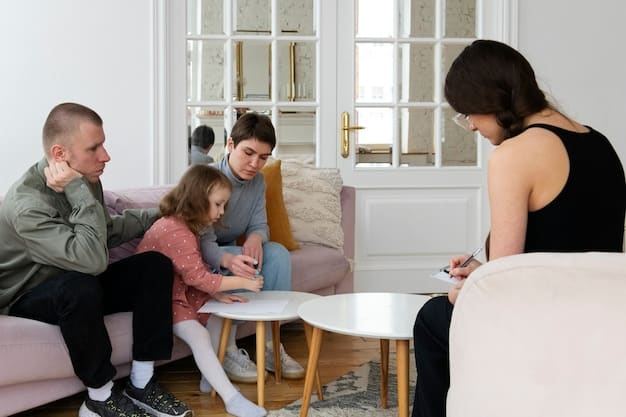Understanding the Role of Family Therapy in Addiction Recovery

Family therapy plays a vital role in addiction recovery by strengthening support systems, improving communication, and addressing underlying family dynamics that contribute to substance abuse.
Embarking on the journey to recovery from addiction is a challenging endeavor, often requiring a multifaceted approach. While individual therapy and support groups are crucial components, the role of family therapy in addiction recovery: strengthening support systems cannot be overstated. By involving the family unit, therapy can address deeper issues, improve communication, and create a more supportive environment for lasting sobriety.
The Importance of Family Involvement in Addiction Recovery
Addiction doesn’t just affect the individual struggling with substance abuse; it impacts the entire family. Recognizing this interconnectedness is the first step in understanding the significance of family involvement in the recovery process. Family therapy acknowledges that addiction is often a systemic issue, influenced by and influencing family dynamics.
When families actively participate in therapy, it fosters a sense of shared responsibility and understanding. This collaborative approach can break down barriers, rebuild trust, and create a united front against addiction.
Understanding Addiction as a Family Issue
Viewing addiction as a family issue, rather than solely an individual problem, allows for a more comprehensive and effective approach to treatment. Family therapy helps to identify and address the underlying issues that may be contributing to the addiction.
- Identifies Enabling Behaviors: Family members may unknowingly enable the addiction by covering up for the individual or making excuses for their behavior. Therapy can help identify and change these patterns.
- Addresses Co-dependency: Co-dependency is a relationship dynamic where one person is overly reliant on the other, often to the detriment of both. Family therapy can help break these unhealthy patterns.
- Heals Past Trauma: Addiction can often be linked to past trauma experienced by the individual or within the family. Therapy provides a safe space to address and heal from these experiences.
By addressing these factors, family therapy strengthens the support system, making it more resilient and conducive to long-term recovery.
In conclusion, recognizing the far-reaching impact of addiction on the family unit highlights the critical need for family involvement in the recovery journey. This involvement helps to address systemic issues and foster a supportive environment for lasting change.

Benefits of Family Therapy for Addiction Recovery
Family therapy offers a multitude of benefits for those recovering from addiction and their loved ones. Beyond simply providing support, it equips families with the tools and strategies to navigate the challenges of addiction and build a healthier, more functional dynamic.
These benefits extend to improved communication, strengthened relationships, and a greater understanding of addiction itself. Let’s examine some key benefits in detail.
Improved Communication and Understanding
One of the primary benefits of family therapy is improved communication. Addiction often creates a climate of secrecy, mistrust, and miscommunication. Therapy provides a structured environment for family members to express their feelings, concerns, and needs in a safe and constructive manner.
- Open Dialogue: Therapy facilitates open and honest conversations, allowing family members to share their experiences and perspectives without judgment.
- Active Listening: Family members learn to actively listen to each other, fostering empathy and understanding.
- Conflict Resolution: Therapy equips families with strategies for resolving conflicts in a healthy and productive way.
When communication improves, family members are better able to support each other, navigate disagreements, and work together towards shared goals.
Breaking Down Destructive Patterns
Addiction often perpetuates destructive patterns within the family. These patterns can include enabling behaviors, co-dependency, and communication breakdowns. Family therapy helps to identify and break these cycles, creating a healthier family dynamic.
In essence, family therapy offers a wide array of benefits that extend beyond simply addressing the addiction itself. By improving communication, understanding, and breaking down destructive patterns, it creates a stronger foundation for lasting recovery.
Common Approaches in Family Therapy for Addiction
Several therapeutic approaches are commonly used in family therapy for addiction recovery, each with its unique focus and techniques. These approaches can be tailored to meet the specific needs of the family and the individual struggling with addiction.
Understanding these various approaches can help families choose the best path for their recovery journey. Here are some common approaches:
Systemic Family Therapy
Systemic family therapy views the family as an interconnected system, where each member’s behavior influences the others. This approach focuses on identifying and changing the dysfunctional patterns within the system that contribute to the addiction.
Systemic family therapists work with families to understand how their interactions perpetuate the addiction. By changing these patterns, the family can create a more supportive environment for recovery.
Cognitive Behavioral Therapy (CBT)
CBT helps family members identify and change negative thoughts and behaviors that contribute to the addiction. This approach focuses on teaching coping skills, improving communication, and managing triggers.
- Identifying Triggers: Families learn to identify the triggers that lead to substance use, such as stress, anxiety, or social situations.
- Developing Coping Mechanisms: Family members develop healthy coping mechanisms for managing triggers, such as relaxation techniques, exercise, or support groups.
- Challenging Negative Thoughts: CBT helps family members challenge negative thoughts and beliefs that contribute to addiction.
Multidimensional Family Therapy (MDFT)
MDFT is an intensive, comprehensive approach that addresses multiple aspects of the adolescent’s life, including their family, peers, school, and community. This approach is particularly effective for adolescents struggling with substance abuse.
Ultimately, the choice of approach will depend on the specific needs and circumstances of the family. A qualified therapist can help families determine which approach is best suited to their situation.

Overcoming Challenges in Family Therapy
While family therapy offers numerous benefits, it’s important to acknowledge that it can also present challenges. Addressing these challenges proactively can help families navigate the process more effectively and achieve positive outcomes.
These challenges can range from resistance to therapy to difficulty in confronting difficult emotions. Let’s delve into some common hurdles and strategies for overcoming them:
Resistance to Therapy
One common challenge is resistance to therapy. Some family members may be skeptical of the process, unwilling to participate, or defensive about their role in the addiction. It may be one of the hardest things to get people to accept.
To address resistance, it’s important to emphasize the benefits of therapy, communicate the importance of their involvement, and create a safe and non-judgmental environment. Sometimes, beginning with individual sessions can help ease resistance before transitioning to family therapy.
Confronting Difficult Emotions
Family therapy often involves confronting difficult emotions, such as anger, guilt, shame, and resentment. This can be a painful process, but it’s essential for healing and growth.
It is important to create a safe and supportive environment where family members feel comfortable expressing their emotions. A skilled therapist can guide families through this process, helping them to process their feelings in a healthy way.
Maintaining Consistency and Commitment
Family therapy requires ongoing commitment and consistency. It’s important for family members to attend sessions regularly, participate actively, and practice the skills they learn in therapy outside of sessions.
- Scheduling Time: Make therapy a priority by scheduling regular sessions and avoiding cancellations.
- Practicing Skills: Practice the communication and conflict-resolution skills learned in therapy in everyday interactions.
- Seeking Support: Seek support from other family members, friends, or support groups to help you stay committed to the process.
Ultimately, overcoming these challenges requires patience, understanding, and a willingness to work together as a family. With the guidance of a skilled therapist, families can navigate these hurdles and reap the rewards of family therapy.
Finding a Qualified Family Therapist
Finding a qualified family therapist is crucial for the success of family therapy in addiction recovery. A skilled therapist can provide guidance, support, and expertise to help families navigate the challenges of addiction and build a healthier dynamic.
But how do you find the right therapist for your family? Here are some important considerations:
Credentials and Experience
Ensure that the therapist has the appropriate credentials and experience in family therapy and addiction treatment. Look for therapists who are licensed in your state and have specific training in family systems therapy.
Additionally, ask about the therapist’s experience working with families struggling with addiction. The more experience they have, the better equipped they will be to understand and address your family’s unique needs.
Therapeutic Approach
Consider the therapist’s therapeutic approach and how well it aligns with your family’s preferences and needs. Some therapists may specialize in systemic family therapy, while others may use CBT or other approaches.
It’s important to find a therapist whose approach resonates with your family and feels comfortable for everyone involved.
Establishing a Good Rapport
The therapist-family relationship is a crucial factor in the success of therapy. It’s important to find a therapist with whom you and your family feel comfortable and safe. It is important everyone involved trusts the therapist and is comfortable in the group.
Before committing to therapy, schedule an initial consultation to meet with the therapist, ask questions, and assess whether you feel a good connection. Trust your instincts and choose a therapist who you feel you can trust and confide in.
By carefully considering these factors, you can increase your chances of finding a qualified family therapist who can help your family heal and recover from addiction.
Long-Term Strategies for Maintaining Family Wellness After Therapy
Family therapy is not a one-time fix; it’s a stepping stone towards long-term family wellness. After completing therapy, it’s essential to implement strategies to maintain the progress you’ve made and prevent relapse.
These strategies should focus on strengthening communication, reinforcing healthy boundaries, and maintaining a supportive environment. Let’s explore some key strategies for long-term family wellness:
Continuing Open Communication
Continue to prioritize open and honest communication within the family. Make time for regular family meetings where everyone can share their thoughts, feelings, and concerns.
Reinforcing Healthy Boundaries
Maintain healthy boundaries to protect the individual recovering from addiction and prevent enabling behaviors. This may involve setting limits on contact, financial support, or other forms of assistance.
Seeking Ongoing Support
Continuing to seek ongoing support from support groups, individual therapy, or other resources can help prevent relapse and maintain long-term recovery. The support ensures there is always someone there in times of need.
- Support Groups: Participate in support groups for families affected by addiction, such as Al-Anon or Nar-Anon.
- Individual Therapy: Continue individual therapy for the person recovering from addiction to address any underlying issues and prevent relapse.
- Family Check-ins: Schedule periodic family check-ins with a therapist to address any new challenges and maintain progress.
By implementing these strategies, families can create a strong foundation for lasting wellness and prevent relapse. Long-term commitment to these practices is key to maintaining a healthy and supportive environment for everyone involved.
| Key Point | Brief Description |
|---|---|
| 🤝 Family Involvement | Essential for addressing systemic issues and providing support. |
| 🗣️ Communication | Improved communication fosters understanding and trust among family members. |
| 🛡️ Boundaries | Setting healthy boundaries protects the individual and prevents enabling behaviors. |
| 🌱 Long-term Support | Continued support from groups and therapy ensures lasting wellness. |
Frequently Asked Questions
▼
Family therapy for addiction is a therapeutic approach that involves the entire family in the recovery process, addressing underlying family dynamics that contribute to substance abuse.
▼
It helps by improving communication, strengthening support systems, identifying enabling behaviors, and fostering a healthier family environment conducive to sobriety.
▼
Common approaches include systemic family therapy, cognitive behavioral therapy (CBT), and multidimensional family therapy (MDFT), tailored to meet the family’s specific needs.
▼
Challenges may include resistance to therapy, difficulty confronting difficult emotions, and maintaining consistency and commitment to the therapeutic process.
▼
Look for therapists with appropriate credentials, experience in addiction treatment, and a therapeutic approach that aligns with your family’s needs, ensuring a good rapport.
Conclusion
In conclusion, the role of family therapy in addiction recovery: strengthening support systems is paramount. By involving the family unit, therapy addresses deep-seated issues, enhances communication, and creates a supportive atmosphere vital for sustained recovery. While challenges may surface, proactive strategies and a committed approach can navigate these hurdles, making family therapy an invaluable asset in the journey to sobriety and lasting family wellness.





